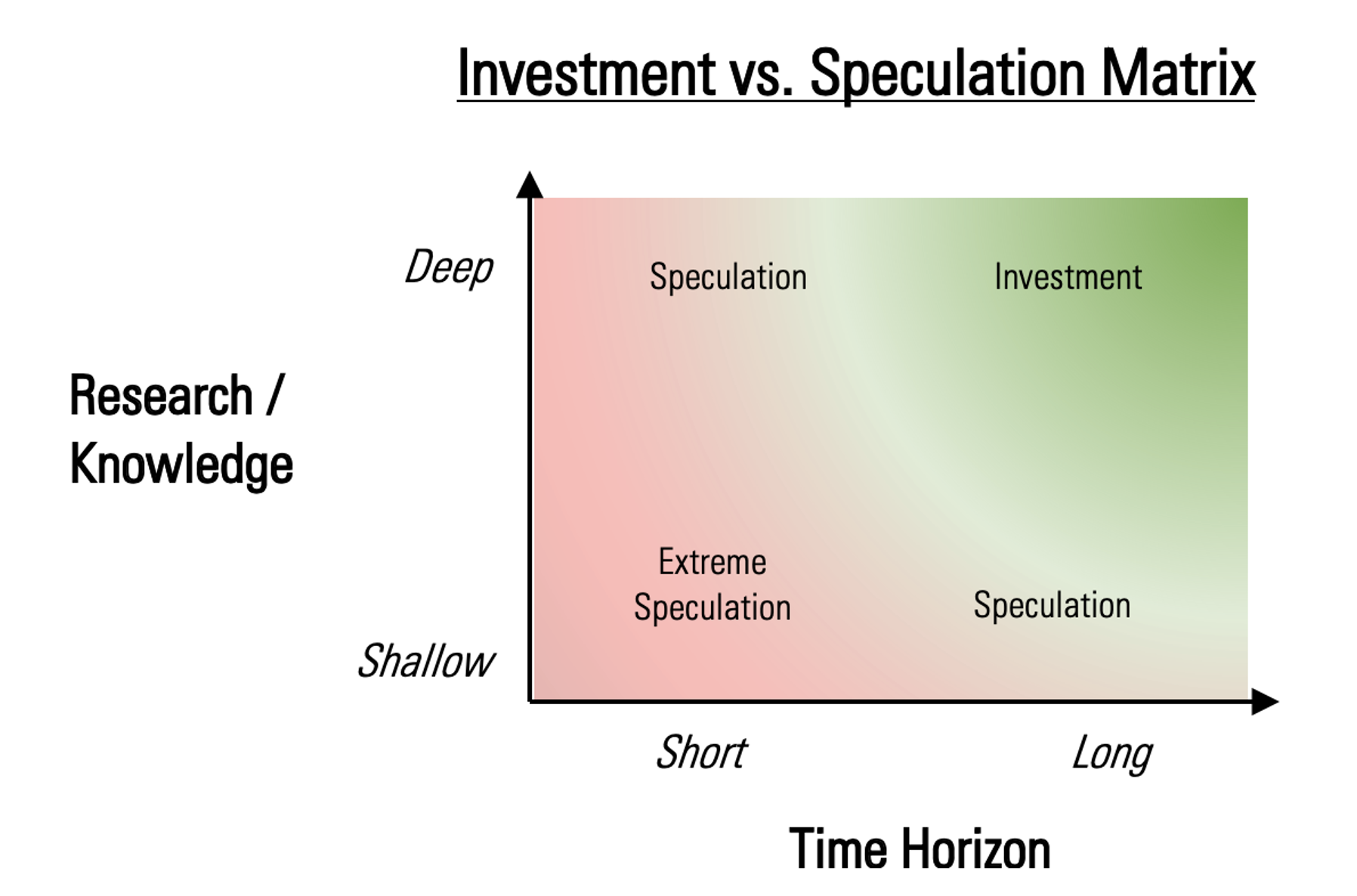The Thrill of the Trade
Why we speculate, and how to do it safely.

We hear a lot about the irrational behavior of investors, and much of the time it’s attributed to heady things like overconfidence and other cognitive biases. But what about good old-fashioned greed and the thrill of the game?
One of the most well-known secrets of the financial industry is that despite the tried-and-true advice to buy and hold diversified funds for decades of slow growth, the fact remains that playing the market is exciting. Most traders likely know that the smart money is placing long, slow bets on carefully vetted funds, but some are more excited by fast money and the thrill of hunting for that diamond in the rough that will generate a return of 10, 20, or 100 times.
Who Gambles in the Stock Market?
There are (at least) three major groups of stock market gamblers. Knowing which type describes you may help you protect yourself from catastrophe.
Noobs
The first group of stock market gamblers are those who are new to investing and don’t know the difference between investment and speculation.
When I talk about investing, I’m referring to the practice of buying securities that are deemed likely to rise in value over time based on a careful analysis of the fundamental characteristics of the asset, and long-term market assumptions.
Speculating, on the other hand, is essentially gambling. With speculation, there is a large probability that you will lose your investment, and a small probability that it will grow by leaps and bounds. The line between the two isn’t always crystal clear, and it likely depends on how much information you have and how quickly you expect to sell the asset after buying.
As a shortcut for determining whether something is more of an investment or a gamble, one way to think about it is in terms of where the asset falls on the two-dimensional spectrum of information and time. (Thanks to Jeff Ptak, Morningstar’s chief ratings officer, for this useful framework.) When you have reliable information, and you know how to interpret it, you can reduce some uncertainty, making a buy or sell decision less of a gamble. Likewise, if you plan to hold the asset for a long time, you can rely more on market assumptions to reduce uncertainty. But a shortage of either time or information increases uncertainty, making the outcome more of a gamble.

Generally speaking, the shorter your time horizon and the less information you have, the more speculative the investment.
For example, we usually think of well-diversified index funds as a sound investment, and over a long time horizon, they tend to be. However, if you buy and sell in the span of days or weeks, then even a well-diversified fund is a gamble since market performance is extremely uncertain in the very short run. On the other end of the diversification spectrum, we would usually think of buying shares of a single company as highly speculative since any one company can go out of business, taking your money with it. However, if you’ve done deep research on the fundamentals and you have reason to believe that the long-term value of the asset is greater than the current market price, it may in fact be a sound investment.
If you’re new to investment and want to know how to make solid, long-term plays based on fundamental analysis, it’s best to ignore the news, the talking heads, and anything that sounds like a hot tip. Instead, read about value investing and avoid stock market gambling if you can.
Dreamers
Younger than the typical investor, with less income and education, many of the people who are drawn to lotterylike investments are the same folks that play state and local lotteries. It’s perhaps not surprising that when wealth feels out of reach in daily life, the idea of fast money and overnight success would be appealing. If financial success is unlikely anyway, why not roll the dice for the chance at a big win? In fact, the preference for lotterylike investments increases in times of economic downturns, supporting the idea that this type of investing is especially attractive to people who are struggling to get ahead.
By the numbers, someone who spends $10 per week on Powerball tickets for 30 years (given an average jackpot of $255,000,000) will have spent $15,600 on tickets and won about $14,100 over that time, making their total expected return a negative $1,500, or negative 9.21%. For some, that may feel like a fair deal for 30 years of weekly entertainment. However, if they had invested that $10 per week in a fund that earned just 4% per year, they would have more than $35,000 to show for it over that same time.
To dreamers, these numbers don’t matter because playing the lottery isn’t about making a cool, calculated choice that favors the most probable outcome. Gambling is about the small-but-real possibility of striking it rich and the dream of an instant solution to all your financial worries. It’s about the thrill of possibility, not the doldrums of reality. This leads us to the third type of stock market gambler.
Thrill-seekers
Some people love the thrill of high-stakes games, and are willing to pay for the rush of adrenaline that goes along with taking major risks. An interesting study of frequent traders found that they tended to be higher in the personality trait of sensation-seeking than their buy-and-hold peers.
Sensation-seeking is defined as “The seeking of varied, novel, complex, and intense sensations and experiences, and the willingness to take physical, social, legal, and financial risks for the sake of such experience.” This personality trait has been linked to risky behavior across several domains. Sensation-seekers are more likely to use and abuse drugs, have unprotected sex, drive faster, and enjoy gambling, among other things.
It’s important to note that personality traits differ from mindsets or beliefs in that they are resistant to change. No amount of information or logic is likely to turn a thrill-seeker into a play-it-safe type. This is why no amount of data showing that active traders underperform buy-and-hold investors will ever eliminate gamblers from the markets. Players, as the saying goes, are gonna play. The game is the reward.
“The sensation-seeker underestimates or accepts risk as the price for the reward provided by the sensation or experience itself…The low sensation-seekers are not just risk aversive; they see no point or reward in the sensation-seeking activities that could justify what they regard as the high levels of risk involved. This is why high and low sensation seekers cannot understand each other, even if they are husband and wife, parent and child, or therapist and client.”
If you think that professional investors are immune to sensation-seeking, think again. One interesting study split professional hedge fund managers into two groups. Since speeding and other traffic violations are often used as a measure of sensation-seeking, the researchers grouped the fund managers according to the type of car they drove; those that owned performance sports cars, and those that did not. (I found this both amusing and accurate, as I am personally a performance car owner and sensation-seeker.)
The researchers then compared the trading activity of the two groups and found that the thrill-seeking, fast-car-driving fund managers were significantly more likely to invest in lotterylike securities than their minivan-driving peers. As expected, they also underperformed the slow-car-driving group, so they paid for their thrills with their clients’ money. Something to think about if you’re outsourcing your investments to a professional.
How Can I ‘Play Responsibly’?
For those who identify with the sensation-seeking personality trait, who love the thrill of the trade, or who are intent on gambling in the market despite all the evidence that it’s a losing proposition, there are strategies that can help reduce the potential damage while keeping the thrill of the game alive.
- Most importantly, don’t gamble with money you can’t afford to lose. Set aside an amount of money that you can part with and use that for speculation. This keeps the game going without turning the downside into losses that can ruin you. You can still potentially make a lot of money this way, but you won’t lose your life or livelihood in the process.
- Do not gamble with money that isn’t yours to lose. If you share finances or manage money for others, make sure you keep your speculation separate from these funds. The only exception would be if you have the informed consent of the other party.
- Do not speculate on the margin. In other words, don’t borrow money to gamble in the market. Borrowing in order to gamble makes financial ruin more likely in the long run. Leverage is best used when you have all the information and time necessary to reduce your risk exposure.
Getting Help for Thrill-Seeking Tendencies
If you honestly feel that you can’t abide by the guidelines laid out above, then I hope you will consider learning about gambling addiction and how to overcome it. Those with thrill-seeking personalities are at higher risk for getting involved in dangerous and addictive behaviors that can quickly turn a fantasy into a nightmare. If this describes you, you’re not the first or the only one.
There are ways out of the habit cycle and people who would love to help you find them. You can learn more about gambling addiction symptoms and treatment here.
The author or authors do not own shares in any securities mentioned in this article. Find out about Morningstar’s editorial policies.

/s3.amazonaws.com/arc-authors/morningstar/6c608d29-bb89-4580-943a-7819645ad538.jpg)
:quality(80)/cloudfront-us-east-1.images.arcpublishing.com/morningstar/5N6PBZJLMJEIXBH6EHTKPDK6NE.png)
:quality(80)/cloudfront-us-east-1.images.arcpublishing.com/morningstar/FIN36RNGOFABFDS2NCP2RCCG3I.png)
:quality(80)/cloudfront-us-east-1.images.arcpublishing.com/morningstar/UWZH3VLHBVCIDP2ANJ73YKE4QA.png)